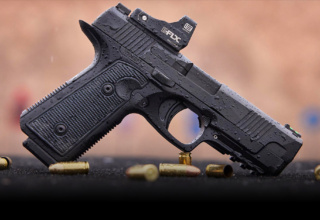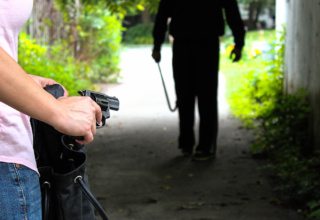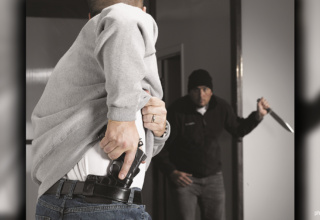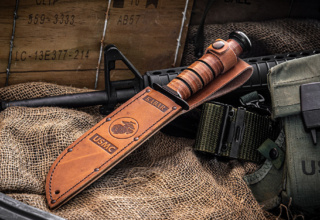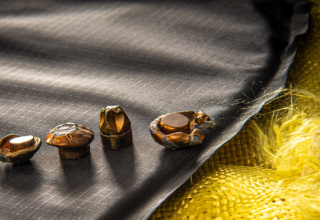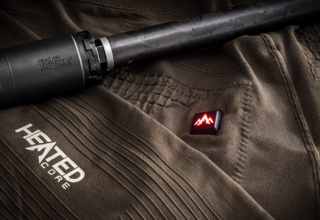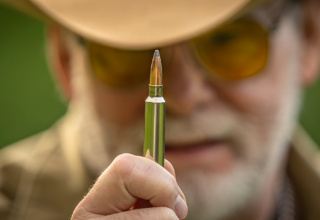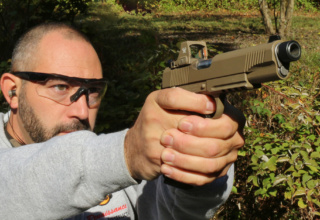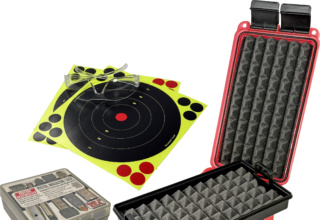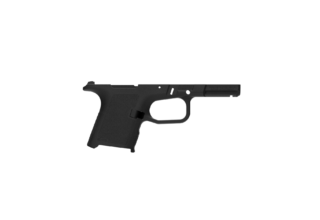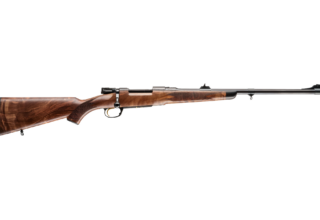In unsettling times, fear is our greatest enemy. Here is how you can take those first steps to replace apprehension with confidence and to protect yourself and those who matter most.
[EDITOR’S NOTE: The Shoot-On staff has worked with our industry associates and partners to produce this article for the benefit of those outside of the hunting, recreational shooting, and personal defense communities because, quite simply, we are concerned with the safety of all our fellow citizens. Changing circumstances and life experiences have a way of altering points of view. Whether the catalyst is economic upheaval, a breakdown of social order, or a global pandemic, long-held beliefs and opinions are often reevaluated when confronted with new realities.
While our neighbors, friends, casual acquaintances, and even family may have opinions quite distant from our own, in the end, we are all Americans with an innate concern for one another regardless of our divergent beliefs and world views. All life and liberties are precious commodities, and our community is especially sensitive to defending and extending these treasures to all whenever they are threatened.
Our goal here is to provide guidance and to minimize any anxieties or fears of those who, for the first time in their lives, may be considering purchasing and learning to use a firearm for personal and family protection. It is not an easy subject to approach for anyone not brought up with shooting or hunting as part of their lifestyle, so our intent is to provide these individuals with a reassuring discussion that allows them to take that first step with less trepidation and greater confidence. To that end, we ask that you join us in this task by presenting this article to your friends and family who are non-firearm owners, as well as sharing it across your personal social media platforms. The more awareness we can raise on this issue, the better it will be for all of us who value life and freedom.]
The global pandemic has handed a new and unwelcome reality to many Americans — especially those for whom societal upheaval and uncertainty have been abstract concepts; something that happens “somewhere else” or “in those other countries.”
Life, social constructs, even the human condition itself exist in a precarious state. We cling to the routine and the predictable, to the safe and the comfortable. As the world once more has been reminded, these states of being can change in a blink. Fear is often the natural first response, and rightly so. It is the emotion that keeps us safe, but only so long as we heed its warnings while refusing to succumb to its own inherent dangers — the inability to think calmly and rationally.

Sadly, it often takes a significant event, such as each of us are now experiencing, or a personal tragedy, such as facing violence for the first time, to shock people out of a mindset or a world view that, “It won’t happen to me.” While such wake-up calls can prepare one for future events, they do little to help them deal with the crisis that brought about the revelation.
The day the switch flipped for most people in this country was March 12, 2020. This was the moment we fully grasped the reality of a global pandemic and its implications. It was the moment when millions of people realized, “I am not prepared for this.”
This unpreparedness manifested itself in many forms — the need for basic supplies, cash liquidity, changes in daily routines, and, quite frightening, the realization that sustaining and protecting oneself is not a responsibility of law enforcement or the state. In short, it is the understanding that, “I am on my own and I am unprepared,” that has fundamentally changed the world view of many.

Crisis does not respect ideology or personal philosophy — it just happens, without regard or emotion. Accepting that fact is the first step to preparing oneself to meet difficult challenges and uncertainties.
Only YOU Can Protect You
The second step is understanding that personal protection and safety depends on you alone. Law enforcement is a reactionary entity. When you are confronted with a potentially violent encounter, law enforcement is not able to protect you. You are responsible for your own safety. The state cannot help you or respond quickly enough to stop a violent encounter. This is true at any time and it is especially true in times of crisis, when emergency resources are stretched thin or are non-existent.
Danger Must be Met with Equal or Greater Force
The third step to personal protection is accepting that your best means of preventing or surviving a violent encounter is to meet the danger with advantageous force. That can mean anything from being smart enough to stay aware of and avoid danger (always the best course of action) to ensuring you have the capability (physical and mental mastery of oneself) or the tools and training to counter a threat.
Those who thoughtfully consider and make defense of self and family a lifestyle choice understand that a defensive firearm in the hands of a trained practitioner is the last, best option for protection — as a threat deterrent and, if no other course of action is possible, as a threat eliminator.

As precious a tool as a firearm is when life must be vigorously defended, not all have shared this view or have been raised in a culture of family or friends where firearm use and ownership have been ingrained into their lifestyle. When conditions arise, such as we are now experiencing, where life and the property needed to sustain it are at potential risk, the non-firearm owner feels, understandably, frightened and vulnerable.
Are You Ethically Ready?
Before taking the first steps to firearm ownership, though, you must consider the responsibilities involved not only with firearm safety and proper training, but also with the ultimate application of a personal defense weapon.
The use of deadly force is something no lawful citizen ever wishes to employ, but the pre-decision to use deadly force when no other recourse is available to protect yourself or an innocent life is one you must make before purchasing a firearm for defensive purposes. That is not an ethical hurdle to cross in the moment of crisis. You must also be prepared to accept the emotional and legal consequences should you have to use deadly force. These are decisions all self-defense practitioners have had to work through before committing to purchasing and carrying a defensive firearm, and so will you.
So, How Does This Work?
You have come to understand that the world does not abide by your desires; that safety and security is never guaranteed in the best of times and is certainly sketchy when things go truly wrong. You realize that the burden of defending yourself and your family rests completely on your shoulders — civil authorities cannot protect you. It is up to you. You are ready to accept the responsibilities of firearm ownership and have worked through the moral and ethical implications of using deadly force should the need arise. You are prepared to join the ranks of millions of legal and law-abiding gun owners who are already committed to personal and family protection.
Now what do you do?
Start by looking to your gun-owning friends, family, and trusted acquaintances for an introduction to firearms. Your prior feelings on firearms and 2nd Amendment rights may not have always squared with theirs, but you can be sure they will be more than happy to answer your questions and help alleviate your apprehensions.

Also, it’s okay to be nervous. Approaching firearms can be a great source of anxiety for someone who has never used them or been around them. Firearm owners understand this. Some of them may have even been in the same position as you are in now and they “get it.” Frank discussions about firearms between friends and family have a way of easing those fears and preparing the soon-to-be new firearm owner for the next step in their journey…visiting a firearm retailer.
Purchasing a Firearm
The recent surge in new firearm owner purchases (people who are buying firearms for the first time) is revealing some interesting anecdotes and unraveling the many myths and misconceptions non-firearm owners have believed to be true.
We are hearing stories of first-time buyers who are shocked that they can’t simply buy a gun off the Internet and have it delivered to their home.
Many first-time buyers are frustrated that they cannot walk into a gun store, make a purchase, and immediately walk out with their new firearm.
Still others are dismayed to learn that they cannot just buy a firearm directly from a friend or family member.
These are just a few of the untruths and misconceptions about firearm purchasing that have been perpetuated by the media, partisan politicians, and certain advocacy groups who take a dim, even hostile view, of private firearm ownership.

While some states do permit no-delay/no third-party background check firearm sales between private citizens, many do require state or local intervention, permits, background checks, or other forms of approval before such sales can be made between individuals. This is a state-by-state situation, so you must check with local or state officials before engaging in a private firearm transaction.
Regarding firearm sales via the Internet, the truth is that you can purchase a firearm online but you may only take possession of the firearm after it has been transferred to a Federally licensed dealer and you have passed all required background checks and obtained any permits required by your state or local authorities. Although the standard Federal National Instant Criminal Background Check System (NICS) takes only minutes, in most cases, individual state and local approval can take days or weeks to complete. So, know that even in “normal times,” the process of purchasing and taking possession of a gun can present many hurdles you may have to overcome. In a crisis, where days count, this can be extremely frustrating.
By far, most firearm purchases are done at the brick-and-mortar level — from small, dedicated gun shops to the larger national franchises and box stores. For the first-time firearm buyer, we recommend visiting a firearm/sporting goods store, as their owners and sales associates typically have deep experience not only in the many firearms they carry, but in working with new, first-time firearm owners. They can listen to your needs and concerns and guide you toward a purchase that makes sense for you.

A good gun shop or sporting goods store attendant can also help set you up with everything you need in terms of support materials and accessories, such as holsters, ammunition, safe storage solutions, and other necessary items.
I Have Purchased a Gun. Now What?
One word nearly encapsulates the totality of firearm use and ownership: SAFETY. As a gun owner, you are responsible for the safe use, handling, accessibility, and storage of your firearm.
Before you do anything with your new firearm, you must learn firearm safety. This video from the National Shooting Sports Foundation provides a fundamental overview of what basic firearm safety entails:
While information on firearm safety and shooting fundamentals can be found online, there is no substitute for learning from someone who is qualified to teach new students. Formal instruction in firearm operation is something we always recommend, and a good place to start is with your local firearm dealer.
There are many gun shops across the country that have indoor ranges or outdoor facilities and can provide a variety of training classes for beginner shooters and those who wish to apply for a concealed carry permit (allows the permit holder to carry a defensive firearm in a concealed manner). If your local gun shop does not offer this service, they most likely can put you in contact with a certified instructor in your area. Many times, these instructors are area law enforcement officers who conduct training classes in their off-duty time.
The US Concealed Carry Association is another good source for locating nearby certified instructors and ranges. The USSCA’s Training lookup page provides information on hundreds of training resources across the country.
Also, the National Rifle Association offers a strong and dedicated network of certified instructors who conduct numerous types of firearm and personal protection courses. Visit the organization’s Student Courses page to locate training options near you.
While all shooting instructors are experienced in training a diversity of students, new women shooters are sometimes more comfortable being introduced to firearms by women instructors. Fortunately, there are many women instructors out there who thrill at the opportunity to help other women make the transition to firearm owner and shooter.

What You Will Come to Understand
Guns are tools, and like any tool, they work as intended. Insert a cartridge in the chamber, cock the hammer, pull the trigger, and the resulting expansion of gas will push the projectile out of the barrel at lethal velocity. This is what a firearm is designed to do, but you are the one who will be responsible for and who will control that tool.
That may sound, now, somewhat alarming. It may seem like a monumental responsibility to accept. It is. Just know that the uneasiness will not last. In fact, it will likely subside before the end of your first formal training session.
This is something we see time and time again when first-time shooters — scared, intimidated, nervous, unsure of themselves — receive their structured introduction to firearms. Fear and uneasiness are often quickly replaced with confidence. And as you become more familiar with your firearm and comfortable with its operation, your shooting and handling skills will improve while your anxieties diminish. This is all part of the natural evolution of a new shooter — something to be embraced, even celebrated, because in this process, you have also empowered yourself with the confidence and skills needed to protect yourself and your family.
Few rewards are greater than this.
A Clash of Worlds or a Coming Together?
We began this discussion by pointing out that our views are (or at least should be) continually changing and adapting to better meet the realities we live in. The current pandemic has certainly changed the views of many in this country regarding firearm ownership. Sometimes, though, it only takes an open mind and a meeting of divergent viewpoints to find mutual ground and respect.

Frank Melloni, who runs Renaissance Firearm Instruction out of Long Island, New York, relates an experience that is quite common when prejudices towards firearms are set aside and objectivity enters the picture.
“Stephen [name changed – Ed.] was a 15-year-old high school student just six years ago,” said Frank. “At the time, he told his mother that he wanted to learn how to shoot. His mother reached out to me with a natural concern and, of course, a predetermined idea of the shooting sports. After a little face-to-face time, she became one of the first people to tell me that she, ‘Didn’t see me as the gun-owning type.’ I smiled and said I was glad to have the opportunity to show her that gun owners aren’t the uneducated, hysterical types we are often portrayed as being.
“After about a year of lessons, the family decided to buy their first gun. It was only a few months later that the entire family each had their own guns and were going to the range together.
“Today the family resides in North Carolina — largely as an effort to escape New York’s firearms restrictions. While I miss Stephen and his family, I am happy that I was able to introduce them to the shooting world and to represent our community in a favorable manner. For my part, I learned that those who are frequently on the other side of the firearms issue can, indeed, digest new information and think for themselves. We still get together a few times a year and almost always get to the range.”
Firearm Owners Want to Help You, No Questions Asked
The sum of this discussion is for non-firearm owners to understand that they are not alone in this crisis. While you may have philosophical, political, or even lifestyle differences from the woman in your office who shoots with her husband every other weekend or from the friend of a friend who likes to hunt, know that we all have the same desire to keep ourselves and our loved ones safe, and we want to ensure that all law-abiding citizens have that same opportunity. The avenues for becoming a firearm owner are many, and the number of people willing to help you get there are legion.
When you are ready to take that first step, all you must do is ask.




